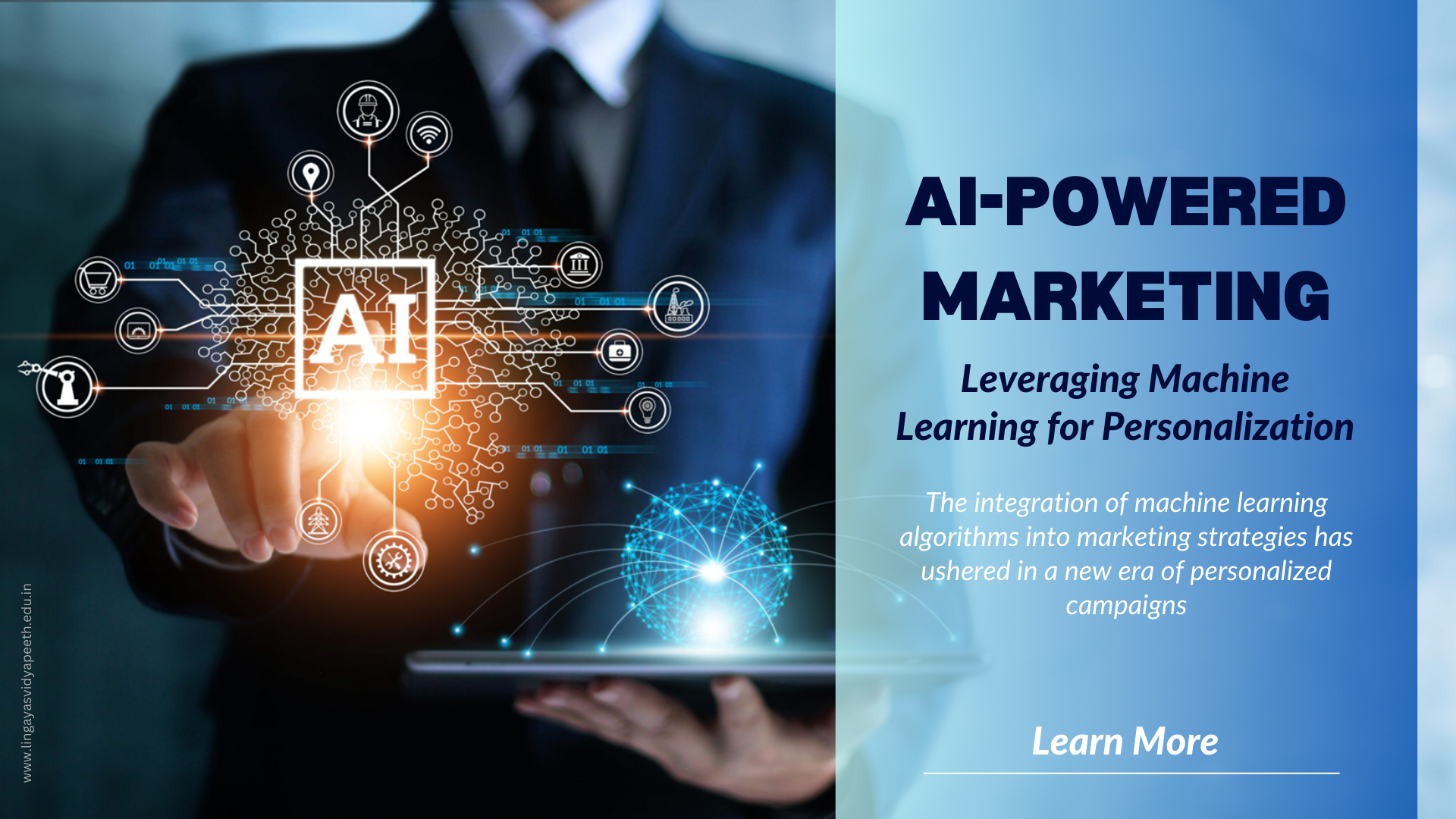Home » AI-Powered Marketing: Leveraging Machine Learning for Personalization

In today’s digitally-driven world, businesses are constantly seeking innovative ways to engage with their customers. Among the myriad of tools and technologies available, one stands out as a game-changer in the realm of marketing: Artificial Intelligence (AI). Specifically, the integration of machine learning algorithms into marketing strategies has ushered in a new era of personalized campaigns, enabling businesses to connect with consumers on a deeper level than ever before.
Business management (BBA and MBA courses) provide insights into modern business techniques, equipping students with valuable knowledge and skills for today’s competitive landscape. In this blog post, we’ll explore the rise of AI-powered marketing and how businesses can leverage machine learning to create highly targeted and effective campaigns.
AI-powered marketing refers to the use of artificial intelligence, particularly machine learning algorithms, to analyze vast amounts of data and make predictions or decisions without explicit human intervention. This technology empowers businesses to automate and optimize various aspects of their marketing efforts, from customer segmentation to content customization and campaign optimization.
Machine learning algorithms, a subset of AI, learn from historical data to identify patterns and trends, allowing marketers to uncover valuable insights into consumer behavior and preferences. By harnessing the power of AI, businesses can deliver more relevant and personalized experiences to their target audience, ultimately driving engagement, conversions, and loyalty.
One of the most significant benefits of AI-powered marketing is its ability to deliver personalized campaigns at scale. Traditionally, marketers relied on broad segmentation criteria to target their audience, often resulting in generic messaging that failed to resonate with individual consumers. However, with machine learning, businesses can now segment their audience based on granular attributes such as demographics, behavior, interests, and purchase history.
By analyzing these diverse data points, machine learning algorithms can create highly detailed customer profiles, enabling marketers to tailor their messages and offerings to meet the specific needs and preferences of each segment. Whether it’s recommending products based on past purchases, delivering targeted promotions to high-value customers, or personalizing email content based on browsing behavior, AI-powered marketing allows businesses to deliver the right message to the right person at the right time.
Furthermore, machine learning enables marketers to optimize campaign performance in real-time by analyzing engagement metrics and adjusting strategies accordingly. Through techniques such as predictive analytics and A/B testing, businesses can continuously refine their marketing efforts to maximize ROI and drive business growth.
Nurturing Ideas, Building Ventures, and Scaling Success

Numerous companies across industries have already embraced AI-powered marketing and witnessed remarkable results. For example, retail giant Amazon utilizes machine learning algorithms to power its recommendation engine, which analyzes customer browsing and purchasing behavior to suggest relevant products. As a result, Amazon has seen a significant increase in sales and customer satisfaction, demonstrating the effectiveness of personalized recommendations.
Similarly, Netflix leverages machine learning to personalize content recommendations for its subscribers, leading to higher engagement and retention rates. By analyzing viewing history, preferences, and ratings, Netflix can deliver a curated selection of TV shows and movies tailored to each user’s tastes, enhancing the overall streaming experience.
While the potential benefits of AI-powered marketing are undeniable, implementing such technologies requires careful planning and execution. Here are some practical tips for businesses looking to leverage machine learning in their marketing strategies:
AI in Education: Transforming the Learning Experience
Conclusion:
In conclusion, AI-powered marketing represents a paradigm shift in how businesses engage with their customers, offering unprecedented opportunities for personalization, optimization, and innovation. By harnessing the power of machine learning, businesses can create highly targeted and effective campaigns that resonate with individual consumers, driving engagement, loyalty, and ultimately, business success.
As we look to the future, the integration of AI into marketing strategies will continue to evolve, empowering businesses to stay ahead of the curve and deliver exceptional customer experiences in an increasingly competitive landscape.
From
Shivangi Priya
Research Assistant
School of Commerce and Management
Lingaya’s Vidyapeeth
Best MBA Colleges In Faridabad
RECENT POSTS
CATEGORIES
TAGS
Agriculture Agriculture future AI Architecture artificial intelligence BA English BA Psychology BTech CSE BTech Engineering Business management career Career-Specific Education career guide Career Opportunities career option career scope Civil engineering commerce and management Computer Science Computer science engineering Data science degree education Engineering Engineering students English Literature english program Exam tips Fashion Design Fashion design course Higher Education Journalism journalism and mass communication law Law career Machine Learning MA Psychology Master degree mathematics MBA Mechanical Engineering Pharmacy Psychology Research and Development students
University Address: Nachauli, Jasana Road, Faridabad, Haryana
Toll Free: 1800-120-4613
Mobile : 8447744303 | 8447744304 | 8447744306 | 8447744309
Address: C-72, Second Floor, Shivalik, Near Malviya Nagar,
Above HDFC Bank, New Delhi 110017
Ph.No. - 011-46570515 / 45138169 / 41755703 / +91-7303152412
Jagmani Kutir, Ground Floor, Road No-1, Rajeev Nagar,
Near Darbar Marriage Hall, Patna-800024, Bihar
Contact No: 9818352069/8130120095
Mail: [email protected]
Copyrights © 1998 - 2025 Lingaya's Vidyapeeth (Deemed To Be University). All rights reserved.
It is important to note that the following email IDs and domains are fraudulent and do not belong to our university.
LV only conducts physical/online verification of any document related to examination on the following email id: